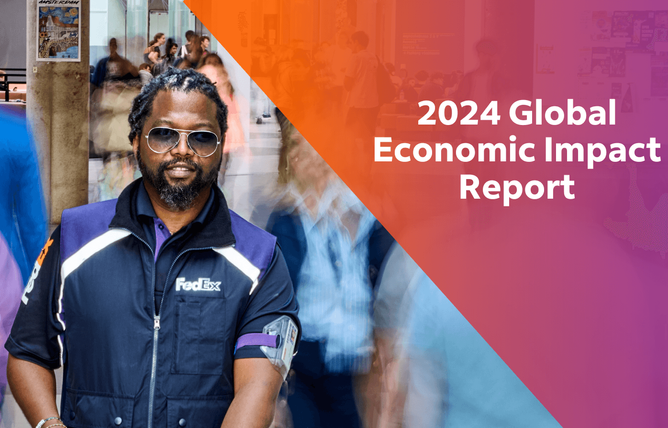FedEx has released its annual economic impact report, which examines the company’s role in building prosperity in local communities during FY 2024.
Recognised as one of the world’s biggest players across any industry, let alone logistics shipping, FedEx provides customers and businesses with a broad portfolio of transportation, e-commerce and business services.
With annual revenue of US$88 billion and a workforce of more than 500,000, the organisation offers integrated business solutions utilising a flexible, efficient and intelligent global network
In a bid to analyse its far-reaching impact, FedEx has released its annual economic impact report, which examines the company’s role in building prosperity in local communities during FY 2024.
Produced in consultation with Dun & Bradstreet, the study underscores the ‘FedEx Effect’ – the impact FedEx has on accelerating the flow of goods and ideas that generate economic growth across countries and regions.
“At FedEx, we have a vision to make supply chains smarter for everyone by leveraging advanced data and technology to better serve our customers and their customers, thereby extending our reach and impact,” explains Raj Subramaniam, President and CEO at FedEx.
“The ‘FedEx Effect’ represents our relentless commitment to excellence, economic growth, and the communities where we live and work.”
Forging connections with customers
FedEx and D&B’s report reveals the transportation giant contributed a staggering US$85bn-plus in direct impact to the global economy in FY 2024, accounting for around 0.1% of the world’s total net economic output.
This activity reflects the sheer scale of the FedEx network, as well as the company’s ongoing efforts to enhance innovative services that help businesses of all sizes connect with customers and strengthen their operations.
The business has the most extensive transportation network in the world, providing service to more than 220 countries and territories. Its team of half a million people work across more than 5,000 sites, moving an average of 16 million packages daily.
FedEx’s various contributions to global net economic output, including through revenue, wages and capital expenditures, create additional economic activity across its business network. This indirect impact activity drives production across industries due to the company’s relationships within and across sectors of the global economy.
In fact, in FY2024, FedEx indirectly contributed an estimated US$39bn to global net economic output, including its largest indirect contribution to the global transportation, storage and warehousing sector.
“At FedEx, we keep the world moving and are very proud of the impact we have on economic activity across industries such as technology, energy, healthcare and pharmaceuticals,” adds Wouter Roels, Regional President, Europe at FedEx.
“This is a particularly special year as we celebrate 25 years of our hub at Paris Charles de Gaulle Airport (CDG), the largest outside the US, which is a significant driver of local economic activity in the surrounding communities.”
European impact
On the subject of Europe, FedEx continues to play a pivotal role in driving economic activity across the continent, which is not only a global hub for services and innovation but also represents an attractive market for foreign business expansion.
With its comprehensive network serving nearly all European countries, FedEx connects European businesses with global opportunities through its air hub at CDG, linking Europe to North America, Asia and the Middle East.
FY 2024 saw FedEx directly contributed an estimated US$10bn – about 0.4% – to the net economic output of Europe’s transportation, storage and communications sector, which grew to an estimated $2.5tn.
Indirect contributions to the European economy reached an estimated $2.9 billion, a 21% increase from the previous year.
This eye-catching growth was supported by: a new logistics facility and headquarters in Dublin, Ireland; upgrading facilities in Karlsruhe and the Leipzig region of Germany; and launching a new pickup and delivery facility in Poland.
These investments have already strengthened the company’s European
FedEx Economic Impact Report: Key highlights
- Trade: FedEx champions trade policies that open new markets, helping fulfil its mission to connect people globally. A recent FedEx-commissioned Morning Consult survey found that US business leaders overwhelmingly agree that global trade drives economic growth, job creation and innovation.
- Operational enhancements: In FY 2024, FedEx streamlined its operations by consolidating its surface network into a unified system. The company expanded its infrastructure with new facilities, including a hub at Dubai World Central Airport and a secondary sorting centre in Memphis. FedEx also upgraded existing locations with modern sorting equipment and expanded warehouse space.
- Sustainability: FedEx is expanding its green initiatives through facility-wide renewable energy adoption, delivery fleet electrification and research into natural carbon capture methods for the transportation sector. The company deployed new electric vehicles (EVs) in FY 2024, adding EVs and zero-emission motorcycles in Brazil, along with EVs in Canada, Chile, Spain, the UK, the Netherlands and the UAE.
- Small businesses: FedEx empowers small and medium-sized businesses (SMBs) to expand globally and boost local economies through specialised solutions. Using a third-party platform called SME Connect, customers can connect with subject matter experts from FedEx and companies from other industries for solution-focused discussions.
- Supply chain: Small businesses made up 90% of FedEx’s supplier base in calendar year 2023, with the company’s procurement spending supporting roughly 400,000 jobs at small businesses worldwide.
- Giving: Through FedEx Cares, the company strengthens communities via charitable donations, employee volunteering and donated shipping services. In FY 2024, FedEx provided more than US$55m in direct support to NGOs and nonprofits.



